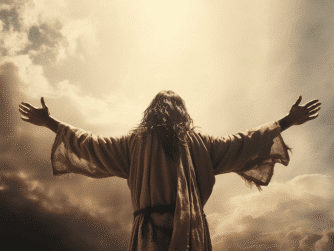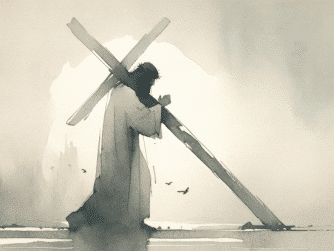This messianic psalm is quoted three times in the New Testament, and is a beautiful expression of praise to God. David is in awe of God’s creation and amazed at a God who chooses not only to glorify himself in the heavens, but glorify a weak, sinful people by making His abode amongst them. Ralph Waldo Emerson once wrote, ‘that if the stars came out only once in a century, people would stay up all night gazing at them.’ Psalm eight is a nature psalm as much as it is messianic, as God shows off His creative splendor, as we explore its contents. Join Carl now to celebrate the awe and splendor of our Heavenly Father, in this exciting broadcast!…
Here is a complete transcript of the podcast…(below)
Welcome friend to our ongoing series on the Book of Psalms and today we will cover Psalm 8. This psalm’s history of composition is long and complex. Like Genesis 1–3, Psalm 8 delicately blends human excellence and human lowliness. In this beautiful expression of praise to God, King David stands amazed that the God of creation, the great and glorious Jehovah, would even pay any attention whatsoever, to the frail people on earth. David understands that God glorifies Himself in the heavens, but how can He glorify Himself on earth through such weak, sinful people? The answer my friend, may be unknown as to precisely why He does this, but He certainly has chosen humanity to share His glory with. In John’s gospel, chapter 17, verse 22, Jesus shares His glory with his disciples, the same glory, his heavenly father gave him. The glory that Moses could not look upon atop Mt Sinai, has now been freely shared by Christ with His followers. Now, the significance of Psalm 8 lies in its approach to Creation and its application to our Messiah, Christ Jesus. The biblical account of Creation was intended to help Israel praise the Lord as the sole Creator of everything in heaven, on earth, and in the sea. The NT applies the glory of humankind to the Messiah, as he has subjected everything to himself. In Jesus’ victory the Christian has received the glorious renewal of which the psalmist speaks Let us now read this psalm in its entirety, it only had nine verses, but is power packed.
“To the chief Musician upon Gittith, A Psalm of David.1 O Lord our Lord, How excellent is thy name in all the earth! Who hast set thy glory above the heavens. 2 Out of the mouth of babes and sucklings hast thou ordained strength Because of thine enemies, That thou mightest still the enemy and the avenger.3 When I consider thy heavens, the work of thy fingers, The moon and the stars, which thou hast ordained; 4 What is man, that thou art mindful of him? And the son of man, that thou visitest him? 5 For thou hast made him a little lower than the angels, And hast crowned him with glory and honour. 6 Thou madest him to have dominion over the works of thy hands; Thou hast put all things under his feet: 7 All sheep and oxen, Yea, and the beasts of the field; 8 The fowl of the air, and the fish of the sea, And whatsoever passeth through the paths of the seas. 9 O Lord our Lord, how excellent is thy name in all the earth!”
This psalm is both messianic and a nature psalm. “Gittith” referred to here at the beginning of the psalm, means “winepress” and may identify a vintage tune or it could an instrument, most likely the lyre. In verse one, God has set His glory above the heavens and Jesus revealed He will share a measure of His glory with us. The Hebrew term for glory is kabod, a word with the root meaning of heaviness or weightiness. The Greek term for glory is doxa, which means “most exalted state.” All New Testament believers have been exalted to a high state because Christ shares a measure of His glory with us, praise God!
In verse 2, David moves from God’s transcendence to His immanence. Jehovah is so great that He can entrust His praise to infants and children and still not be robbed of glory! Jesus quoted this verse after He cleansed the temple in Matt. 21:16. Think about it, words are only sounds plus breath, two very weak things. Yet words of praise even from suckling’s (that’s babies who are not yet weaned) and babes (children able to play in the streets) can defeat God’s enemies, through praise and worship, never forget the power of praise. Think friend of what little babies mentioned in the bible, grew up to accomplish. The cry of baby Moses ultimately brought Egypt to her knees. The birth of Samuel was used by God to save Israel and bring David to the throne. And finally, of course, the birth of Jesus brought salvation to this world. Indeed, God has used the weak and helpless to praise Him and help defeat His enemies (1 Cor. 1:27). He likes to show off that way, because He glorifies through our weaknesses. This psalms passage in verse 2 indicates that the words of babes and suckling’s can still or silence the enemy and the avenger. That is why David worshiped God consistently, not only for the expression of adoration but as a weapon to still his enemies from a spiritual standpoint.
David was but a youth when he silenced Goliath and defeated him, probably about 16 years of age in fact, and he brought great glory to the name of the Lord by doing so. God didn’t need us, yet He created us and prepared a wonderful world for us. He created us for His good pleasure, to have fellowship with us. As the Westminster Catechism states it, it is our purpose to “glorify God and enjoy Him forever,” and if we leave God out of our lives, we miss life’s greatest opportunity. The answer to the question posed in verse 4, “What is man?” is ultimately answered by Jesus Christ himself, the “Last Adam,” through whom we regained our lost dominion. Reconstructionist’s and Theonomist’s pretend that man is still crowned with glory and honor today, alluding to the notion, we have full dominion in the earth, presently, which is simply not true. In truth, the church has partial dominion in its possession, but total dominion, will only be achieved when Christ sets up His earthly kingdom. This will be a literal theocratic and military dominion at that time, yet for now the church has a measure of spiritual dominion over the enemy, but only if we choose to enforce the power and authority Christ gave us. This notion of regaining lost dominion from Satan, is reiterated by the Apostle Paul in his address to King Agrippa in Rome, as he recites the very words Jesus spoke to him, at his conversion on the road to Damascus. And this concept really comes to light in the NASB version. Let me now read from the King James Bible, and the same passage in the NASB. And remember, Christ is speaking to the Paul in this narrative.
Acts 26:16–18 says, “But rise, and stand upon thy feet Paul: for I have appeared unto thee for this purpose, to make thee a minister and a witness both of these things which thou hast seen, and of those things in the which I will appear unto thee; Delivering thee from the people, and from the Gentiles, unto whom now I send thee, To open their eyes, and to turn them from darkness to light, and from the power of Satan unto God, that they may receive forgiveness of sins, and inheritance among them which are sanctified by faith that is in me.”
And this same passage from the NASB reads:
‘But get up and stand on your feet; for this purpose I have appeared to you, to appoint you a minister and a witness not only to the things which you have seen, but also to the things in which I will appear to you; rescuing you from the Jewish people and from the Gentiles, to whom I am sending you, to open their eyes so that they may turn from darkness to light and from the dominion of Satan to God, that they may receive forgiveness of sins and an inheritance among those who have been sanctified by faith in Me.’
Ignorance of the dominion principle has cost man dearly down the ages. This principle is the very reason God often gets blamed for the rampant and often unrestrained evil which occurs in this world. God is not fully in charge of everything that occurs down here. God does not approve of everything He allows. The Merriam-Webster Dictionary defines dominion as supreme authority or absolute ownership. The Hebrew term for dominion is radah, which means “to dominate, rule, lead, control, subdue, manage or govern an entity, person or government with considerable forceful authority. We the church get to enforce our dominion in the spiritual realm, by using the word of God which has intrinsic power but God doesn’t have total control of everything…yet. Verse 2 reveals, that as the people worship and serve God, the faithful people of God glorify His name on earth and help to defeat His enemies. Once again, the theme of worship as a weapon is presented. Apart from knowing God, we have no understanding of who we are or what we are to do in this great universe.
Verse 3 and 4, the sun rules the day, but its blinding light usually blots out anything else we might see in the heavens, but at night, we are overwhelmed by the display of beauty from the moon, stars, planets, and galaxies. Ralph Waldo Emerson wrote that if the stars came out only once in a century, people would stay up all night gazing at them. What we know today about the size of the universe makes the earth and its inhabitants look even more insignificant than they appeared in David’s day. Our knowledge of light years and the reaches of outer space gives us even more reason for appreciating our insignificance in the solar system and God’s wonderful concern for us. In His great love, the Lord chose the earth for Himself (Ps. 24:1) and created us in His own image. “Man” in verse 4 is enosh, “weak man,” and “son of man” is “son of adamah—son of the earth, earth-born” (Gen. 2:7). Both titles emphasize the weakness and frailty of humankind; a frailty we are all familiar with, on a daily basis.
God spoke the worlds into existence, but David saw creation as coming from God’s fingers and hands (v. 6), the work of a Master Craftsman. Interestingly, whenever the creation is mentioned Gods fingers are mentioned, whenever the work of the cross or salvation is cited, it is usually God’s arms that are mentioned. understood that creation was proof of a caring Creator who prepared the world for the enjoyment and employment of mankind, yet in time, the Jews eventually worshiped the creation instead of the creator, and the false gods who desire worship in the form of graven images. In the Mesopotamian view the gods had no plan to create people as an integral part of the world that they had set up for themselves. People were only brought into existence as a consequence of the gods becoming tired of working so hard to provide for themselves. Humans were made to be servants to deities, who had no interest in hard labor. In this way of thinking human dignity was achieved through the idea that the gods needed them. Yet the one true God Jehovah delights in humanity as the pinnacle of His creation and seeks to do so for his pleasure.
Friend, verse 4 shows God’s occupation with the lives of individuals, families, and nations. God watches over us and He cares for us. Our God is personal yet the philosophers make Him impersonal, transcendent, and unknowable. Our God wants to be known by His creation, in fact HE craves fellowship and relationship. God gave you a revelation of himself in one book, which He prizes. The Bible shows that God is mindful of man, takes knowledge of man and brings each individual man into account. This psalm seeks to shatter the three nefarious philosophies which have clouded man’s godly judgment for the past few centuries, namely, Marxism, Darwinism and Freudian Psychology. As Erwin Lutzer cogently frames it, Marxism attacks God as ruler, Darwinism attacks God as creator and Freudian Psychology attacks God as lawgiver. These three philosophies created a cancer which has attacked society for hundreds of years and sadly your worldview, whether you realize it or not, has been shaped by these cancerous creeds. Such is the importance of reading and meditating on God’s Word, in order to see the world as He sees it.
Verse 5, Why does God pay attention to “frail creatures of dust”? Because He has made them in His own image, and they are special! Instead of humans being “a little higher than apes,” as science believes or Darwin proposed, they are actually “a little lower than God.” The word elohim can mean angelic creatures (see Heb. 2:7), but here it means “God.” The Lord crowned Adam and Eve and gave them dominion over the other creatures (Gen. 1:26–27), which was subsequently lost and regained by Christ at the cross. We are co-regents of creation with the Lord! The angels are servants (Heb. 1:14), but we are kings, and one day, all who have trusted Christ will be like Him (1 John 3:1–3; Rom. 8:29).
It is interesting that the Quaran says that when Allah made Adam, the angels had to bow to Him, yet clearly this statement does not jive with this Psalm. Man was created a little lower than the angels and far beneath God himself, albeit God later came to make His abode with man, being created in His image. In truth, no angel would ever consider bowing to a man, as man is in a lower bracket. In the Bible, saints bow to angels and have done so on three occasions in the Word of God. There is a vestige of rulership lost to the annals of history. Our first parents sinned and lost their crowns, forfeiting that glorious dominion, which I spoke of. According to Romans 5, sin is reigning in our world (v. 21) presently and death is also reigning, but Jesus Christ has regained the dominion for us and will one day share it with us when He reigns in His kingdom (Heb. 2:6–8). When Jesus ministered here on earth, He exercised the dominion that Adam lost, for He ruled over the beasts (Mark 1:13; 11:1–7), the fowl (Luke 22:34), and the fish (Luke 5:4–7; Matt. 17:24–27; John 21:1–6). Today He is on the throne in heaven and all things are “under his feet” (1 Cor. 15:27; Eph. 1:22; Heb. 2:8). The phrase means “completely subjected to Him” (47:4; Josh. 10:24; 1 Kings 5:17). Through the exalted Christ, God’s grace is reigning today (Rom. 5:21) so that God’s children may “reign in life” through Jesus Christ (v. 17). He has made us “kings and priests to His God and Father, to Him be glory and dominion forever and ever. Amen” (Rev. 1:6). By faith, “we see Jesus” (Heb. 2:8–9), crowned in heaven, and that assures us that one day we will reign with Him and receive our crowns (Rev. 20:1–6).
To summarize this psalm: God the Father created us to be kings, but the disobedience of our first parents robbed us of our crowns. God the Son came to earth and redeemed us to be kings (Rev. 1:5–6), and today the Holy Spirit of God can empower us to “reign in life by one, Jesus Christ” (Rom. 5:17). When you crown Jesus Christ Lord of all, you are a sovereign and not a slave, a victor and not a victim. “O Lord, our Lord, how excellent in your name in all the earth!” That is not the case today as the whole world lies in wickedness according to 1st Jn 5:19, but one day, His name will be excellent throughout the earth, for sin will be vanquished, the devil and demon forces cast into the lake of fire and a new heaven and earth will be created for us to enjoy. Join me friend for future broadcasts on the more famous psalms.
https://carljosephministries.com/podcast/trusting-god-for-his-best-part-1-live/
https://www.blueletterbible.org/Comm/mhc/Psa/Psa_008.cfm
Title: Psalm 8: Man is God’s crowning achievement
Bibliography:
Warren W. Wiersbe, Be Worshipful, 1st ed., “Be” Commentary Series (Colorado Springs, CO: Cook Communications Ministries, 2004), 40.
James Luther Mays, ed., Harper’s Bible Commentary (San Francisco: Harper & Row, 1988), 438.
Ruckman Stufy Bible.,
The Perry Stone Hebraic Prophetic Study Bible – Old Testament- King James Version (Fedd Books, Austin, Tx, 2019)
Thru the Bible, with J Vernon McGee (Thomas Nelson Publishers, Volume II (Joshua – Psalms), Nashville, Tennessee, 1982)).
Victor Harold Matthews, Mark W. Chavalas, and John H. Walton, The IVP Bible Background Commentary: Old Testament, electronic ed. (Downers Grove, IL: InterVarsity Press, 2000).
Related keyword searches:








